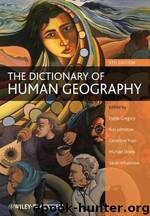The Dictionary of Human Geography by Michael Watts

Author:Michael Watts [Watts, Michael]
Language: eng
Format: epub
ISBN: 9781405132886
Amazon: 1405132884
Publisher: Wiley-Blackwell
Published: 2009-06-21T16:00:00+00:00
Lamarck(ian)ism
A theory of evolutionary change originating with the French naturalist Jean Baptiste de Lamarck (1744 1829). A non Darwinian doctrine of organic progres sion, early Lamarckism differed significantly from its later Neo Lamarckian successor. The dynamic behind Lamarck?s own scheme of evolution along separate lines of development, rather than by common descent, was the active power of nature (combining processes of environmental stimulus, the adaptive habits of organisms in adjusting to modified condi tions, and the use and disuse of organs) to impel life along predetermined sequences (Burkhardt, 1977). (NEW PARAGRAPH) In the decades around 1900, when Darwin ism was in eclipse as a consequence of a series of criticisms within the scientific community, the Lamarckian mechanism of the inheritance of acquired characteristics achieved considerable support as providing an alternative mechanism for evolutionary transformism (Bowler, 1983). This marginal component of Lamarck?s ori ginal scheme became the central plank in Neo Lamarckian interpretations of evolutionary change, which routinely considered that those organic modifications on which natural selec tion operated were environmentally induced. Particularly in the USA, but also in Britain, this alternative evolutionary theory attracted widespread support during the second half of the nineteenth century despite the absence of agreed empirical corroboration. Particularly prominent were the palaeontologists Edward Cope and Alpheus Hyatt, the geologists Joseph LeConte and Clarence King, and the Duke of Argyll and George Romanes in anthropology and psychology. In France, the Soci?t? Zoologi que d?Acclimatation under Isidore Geoffroy St Hilaire vigorously promulgated Lamarckism in projects on environmental adaptation that had implications for human migration and coloni alism (Osborne, 1994). Most dramatic of all was the theory?s official endorsement in the (NEW PARAGRAPH) Soviet Union during the 1930s, where T.D. Lysenko used Lamarckism to justify his ideas about agricultural improvement and judged that it fitted more comfortably with Marxist political ideology than did classical neo Dar winism. (NEW PARAGRAPH) Like Darwinism, Lamarckism also had social implications. Indeed, many social evolutionists drew more inspiration from Neo Lamarckian dogma than from standard Darwinism. For some, it provided grounds for looking to environment as the driving force behind social processes; for others, who were enthusiastic about the role it attributed to mind and will, it reserved space for psychic elements in evolution and thereby enabled them to es cape the pessimism that gripped many at the beginning of the twentieth century. Either way, Lamarckism could be mobilized to justify the politics of social and political interventionism. (NEW PARAGRAPH) Given its various enthusiasms, it is not sur prising that a number of geographers would find Neo Lamarckism attractive, not least because the environment played such a key directive role in the scenario (Livingstone, 1992). In the USA during the late nineteenth and early twentieth centuries, numerous advo cates of environmental determinism, such as Nathaniel Shaler, W.M. Davis, Ellen Semple, Albert Brigham and Ellsworth Huntington, displayed Lamarckian sympathies and used the theory to provide naturalistic readings of human culture. Similarly Turner?s frontier thesis, which portrayed American society as recapitulating the stages of social evolution
Download
This site does not store any files on its server. We only index and link to content provided by other sites. Please contact the content providers to delete copyright contents if any and email us, we'll remove relevant links or contents immediately.
| Historic | Information Systems |
| Regional |
Man-made Catastrophes and Risk Information Concealment by Dmitry Chernov & Didier Sornette(4749)
The Revenge of Geography: What the Map Tells Us About Coming Conflicts and the Battle Against Fate by Kaplan Robert D(3602)
Zero Waste Home by Bea Johnson(3297)
COSMOS by Carl Sagan(2959)
In a Sunburned Country by Bill Bryson(2953)
Good by S. Walden(2920)
The Fate of Rome: Climate, Disease, and the End of an Empire (The Princeton History of the Ancient World) by Kyle Harper(2443)
Camino Island by John Grisham(2391)
A Wilder Time by William E. Glassley(2367)
Organic Mushroom Farming and Mycoremediation by Tradd Cotter(2314)
Human Dynamics Research in Smart and Connected Communities by Shih-Lung Shaw & Daniel Sui(2181)
The Ogre by Doug Scott(2120)
Energy Myths and Realities by Vaclav Smil(2066)
The Traveler's Gift by Andy Andrews(2017)
Inside the Middle East by Avi Melamed(1946)
Birds of New Guinea by Pratt Thane K.; Beehler Bruce M.; Anderton John C(1915)
Ultimate Navigation Manual by Lyle Brotherton(1770)
A History of Warfare by John Keegan(1722)
And the Band Played On by Randy Shilts(1620)
